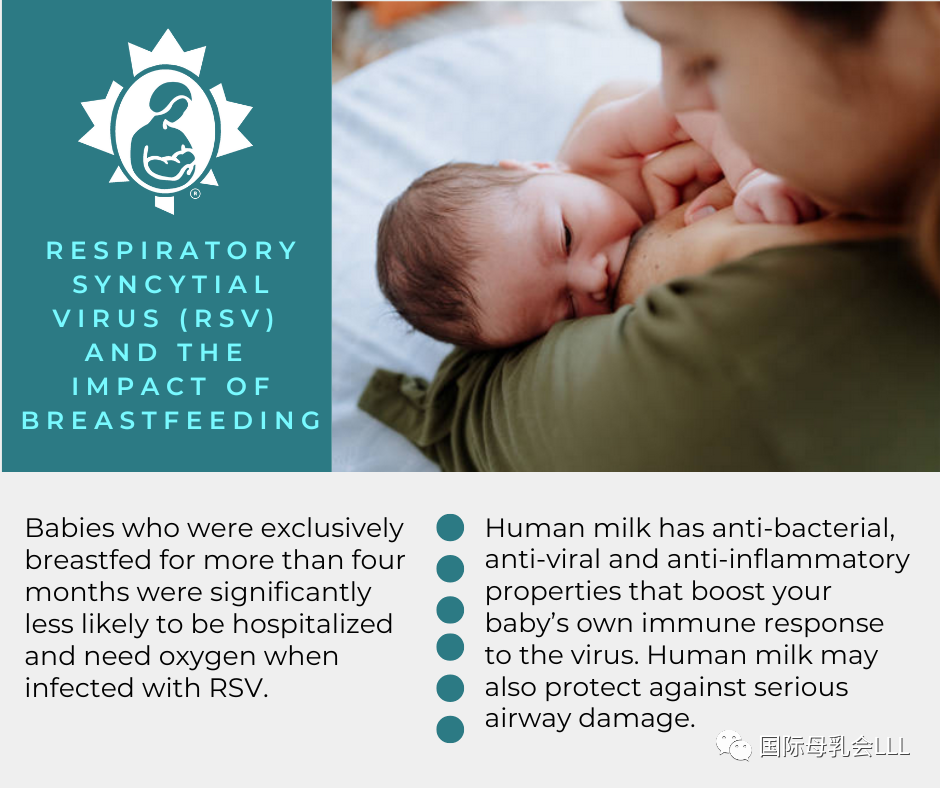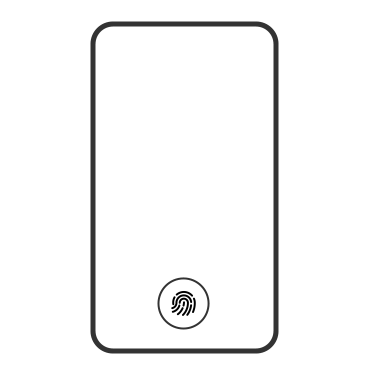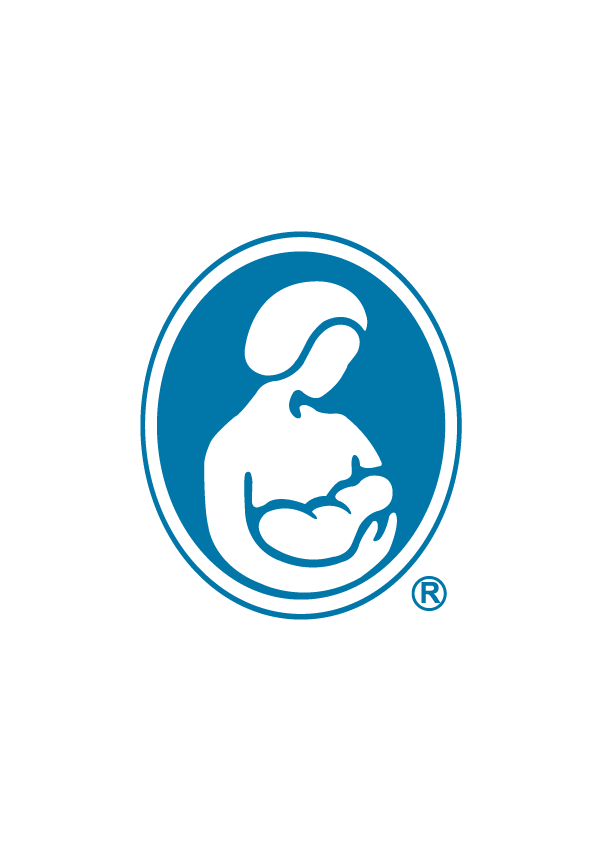

呼吸道合胞病毒(RSV)和母乳喂养对它的影响
出处https://www.lllc.ca/respiratory-syncytial-virus-rsv-and-impact-breastfeeding
Respiratory Syncytial Virus (RSV) and the Impact of Breastfeeding | La Leche League Canada – Breastfeeding Support and Information (lllc.ca)

纯母乳喂养超过4个月的儿童在感染呼吸道合胞病毒(RSV)时住院和需要吸氧的可能性显著降低。
母乳具有抗菌、抗病毒和抗炎的特性,能增强宝宝自身对病毒的免疫反应。母乳还可能预防发生严重的气道损伤。
您可能会担心呼吸道合胞病毒(RSV)以及它可能如何影响您的宝宝。这种病毒很常见。大多数婴幼儿在2岁前时就已经感染过RSV病毒。宝宝感染这种病毒时的年龄越大,疾病的严重程度往往越轻。
研究表明,母乳喂养帮助抵御呼吸道合胞病毒。虽然母乳喂养并不能防止宝宝感染这种病毒,但目前已有的研究都表明,母乳喂养可以降低RSV引起疾病的严重程度。母乳喂养少于2个月的婴儿在感染RSV时更有可能住院。纯母乳喂养超过4个月的儿童在感染RSV时需要住院和氧疗的可能性显著降低。母乳具有抗菌、抗病毒和抗炎的特性,能增强宝宝自身对病毒的免疫反应。母乳还可能预防发生严重的气道损伤。
如果您的宝宝是早产儿、患有肺部疾病和/或心脏病,这些因素可使RSV更容易出现并发症。预防疾病的最有效方法是减少接触病毒,定期勤洗手并继续母乳喂养。如果您担心宝宝接触病毒,请要求人们不要亲吻或拥抱您的宝宝。
如果您有任何关于母乳喂养的问题或疑虑,请联系当地的国际母乳会哺乳辅导,她们可以为您提供支持和信息。
Respiratory Syncytial Virus (RSV) and the Impact of Breastfeeding
You may be worried about respiratory syncytial virus (RSV) and how it might affect your baby. This virus is very common. Most infants have had RSV by the time they are two years old. The older a baby is when they get it, the less severe the infection tends to be.
Studies show that breastfeeding has a protective effect against RSV. Breastfeeding does not prevent your baby from getting infected with this virus. However, all available studies show that breastfeeding reduces the seriousness of the illness. Babies who were breastfed for less than two months were more likely to be hospitalized when infected with RSV. Babies who were exclusively breastfed for more than four months were significantly less likely to be hospitalized and need oxygen when infected with RSV. Human milk has anti-bacterial, anti-viral and anti-inflammatory properties that boost your baby’s own immune response to the virus. Human milk may also protect against serious airway damage.
If your baby was born premature, has lung disease, and/or heart disease, these factors can complicate cases of RSV. The most effective ways to prevent illness is to limit exposure to the virus, wash hands regularly and continue to breastfeed. If you are concerned about your baby being exposed to the virus, ask people not to kiss or cuddle your baby.
If you have any breastfeeding questions or concerns, contact your local La Leche League Leader who can provide you with support and information.
References(参考文献)
Jang M.J., Kim Y.J., Hong S., Na J., Hwang J.H., Shin S.M., Ahn Y.M. (2020.) Positive association of breastfeeding on respiratory syncytial virus infection in hospitalized infants: a multicenter retrospective study. Clinical and Experimental Pediatrics 63(4):135-140. doi: 10.3345/kjp.2019.00402.
Messina, A., Germano, C., Avellis, V.., Tavella, E., Dodaro, V., Massaro, A., Vitale, R., Masturzo, B., & Manzoni, P. (2022). New strategies for the prevention of respiratory syncytial virus (RSV). Early Human Development, 174, 105666.
Mineva G, Philip, R. (2022). Impact of Breastfeeding on the Incidence and Severity of RSV Bronchiolitis in Infants: Systematic Review. Pediatrics, 149, 280.
Mocsny Thomas, S. (2022, October). Respiratory Syncytial Virus (RSV) in Infants. LLL Alliance, Professional Liaison Department.
November 8, 2022
Respiratory Syncytial Virus (RSV) in Babies and Small Children – La Leche League International (llli.org)
https://www.llli.org/breastfeeding-info/rsv/
在2019-2021年,由于2019冠状病毒病(COVID-19)大流行期间限制了大型聚会、在公共场所戴口罩和经常洗手等措施,儿童和成人中包括呼吸道合胞病毒(RSV)在内的呼吸道病毒感染率有所下降。然而,在2022年,RSV和其他病毒一直在增加,许多儿科医院的病房里挤满了患有严重RSV感染的婴幼儿。
母乳喂养的婴儿如果感染了RSV,应继续母乳喂养。研究表明,他们会恢复得更快,更少需要氧疗,母乳中的抗体会保护他们并帮助他们康复。1,2,3
母乳喂养能保护患有呼吸道合胞病毒的婴儿吗?
如果婴儿感染了RSV,母乳喂养是否可以保护婴儿或帮助他们更快地康复?是的!
美国儿科学会建议母乳喂养,因为数据显示,母乳喂养的儿童,以下急性、慢性儿科疾病的发生率会降低:中耳炎、急性腹泻病、下呼吸道疾病、婴儿猝死综合征、炎症性肠病、儿童白血病、糖尿病、肥胖症、哮喘和特应性皮炎。1
研究发现
2022年2月的一项研究报道,“母乳喂养已被证明对患有RSV毛细支气管炎的婴儿具有保护作用。世界卫生组织建议纯母乳喂养至少6个月,以最大限度地抵御婴儿病毒感染。本综述表明,纯母乳喂养和部分母乳喂养可降低疾病的严重程度、缩短住院时间并减少对氧疗的需求。”2
“BMF(母乳喂养)组需要氧疗的RSV感染的严重程度低于AMF(人工配方奶粉喂养)组。母乳对RSV感染的这种保护作用可能会减少对氧疗的需求,这表明气道损伤较小。”3
如果母乳喂养宝宝感染了呼吸道合胞病毒,我该怎么办?
继续母乳喂养非常重要。如果宝宝鼻塞严重,可以尝试以直立姿势哺乳以帮助分泌物排出。请咨询医生是否需要在喂奶前用盐水滴鼻并用球形吸鼻器清除分泌物,这些方法可能有助于保持鼻腔通畅。
如果您的宝宝病得太重或鼻塞太严重而无法母乳喂养,请经常用吸奶器泵奶或手挤奶以喂养宝宝,确保宝宝继续接受母乳中抗体的保护。在生病期间,尽可能经常将宝宝以直立的姿势抱在胸前,这样会让宝宝感到安慰,也会帮助宝宝更轻松地呼吸。研究表明,母乳喂养的婴儿和儿童恢复得更快。
有关呼吸道合胞病毒的常见问题解答
以下信息来自美国疾病控制和预防中心(CDC)网站。4,5这些常见问题包括对RSV的症状、预防以及疾病如何传播的解释。
什么是呼吸道合胞病毒 (RSV)
RSV是一种常见的传染性病毒,可引起下呼吸道感染。大多数感染RSV的人会出现类似于普通感冒的轻微症状。RSV可以在任何年龄感染,但大多数儿童到2岁时都会感染过RSV。它常见于秋冬季和春季。
它是如何传播的?
它可以通过咳嗽和打喷嚏等途径经空气中的飞沫传播、通过接触被RSV污染的门把手等表面,或通过接吻等方式直接接触而传播。病毒可以在硬质表面上存活数小时。
呼吸道合胞病毒的症状是什么?
症状可能包括咳嗽、打喷嚏、流鼻涕、食欲下降、发烧和喘息(喘息是一种高音调的类似吹口哨的声音)。它可能会导致婴儿易怒、活动减少和呼吸困难。在美国,RSV是引起一岁以下儿童毛细支气管炎(肺部小气道炎症)和肺炎(肺部感染)的最常见原因。
哪些人发生呼吸道合胞病毒并发症的风险最高?
早产儿、患有心脏病或慢性肺部疾病的幼儿、免疫系统较弱的幼儿、免疫系统受损的成年人和患有基础心肺疾病的老年人风险最高。6个月以下患RSV的婴儿有1%-2%可能需要住院治疗。
如何预防呼吸道合胞病毒?
采取以下预防措施将有助于减少RSV的传播:比如,经常用肥皂洗手至少20秒,咳嗽和打喷嚏时用纸巾或衬衫袖子的上部遮挡,避免与病人密切接触和共用餐具,以及清洁经常接触的表面,如门把手和移动设备。2岁以上的幼儿和父母可以在人多的地方戴口罩进行防护。2岁以下的儿童戴不了不应戴口罩。避免接触病人。研究表明,母乳喂养也是一种预防措施,为保护婴儿提供重要的抗体。
有没有预防呼吸道合胞病毒的疫苗?
目前有几种疫苗正在研发中。一种RSV疫苗目前正在欧洲进行测试。截至2022年11月,还没有疫苗可常规用于脆弱人群的免疫接种。
Respiratory Syncytial Virus (RSV) in Babies and Small Children
In 2019-2021, due to more limited large group gatherings, masking in public areas and frequent handwashing during the COVID-19 pandemic, respiratory viruses including respiratory syncytial virus (RSV) in children and adults declined. However, in 2022, RSV and other viruses have been increasing and many pediatric hospital wards are full of babies and young children suffering from severe RSV infections.
Breastfeeding babies should continue to breastfeed if they become ill with RSV. Research has shown that they will recover faster, they will need less oxygen therapy, and the antibodies in human milk will protect them and aid in healing.1,2,3
DOES BREASTFEEDING PROTECT INFANTS WITH RSV?
Does breastfeeding protect infants or help them recuperate faster if they are infected with RSV? Yes!
The American Academy of Pediatrics recommends breastfeeding because data show that for children who are breastfed, the following acute and chronic pediatric disorders occur less frequently: otitis media, acute diarrheal disease, lower respiratory illnesses, sudden infant death syndrome, inflammatory bowel disease, childhood leukemia, diabetes mellitus, obesity, asthma, and atopic dermatitis.1
RESEARCH FINDINGS
A research study from February 2022 reported that “breastfeeding has shown to have a protective effect for infants with RSV bronchiolitis. The World Health Organization recommends minimum six months of exclusive breastfeeding for maximal immune protection against viral infections in infants. This review shows that exclusive and partial breastfeeding reduces severity of disease, length of hospital stays and supplemental oxygen requirements.”2
“The severity of RSV infection requiring oxygen therapy was lower in the BMF (breast milk feeding) than the AMF (artificial milk formula fed) group. This protective role of human milk on RSV infection might decrease the need for oxygen therapy suggesting less airway damage.” 3
WHAT DO I DO IF MY BREASTFEEDING BABY IS INFECTED WITH RSV?
It is very important to continue breastfeeding. Is your baby very congested? Try feeding in an upright position to help with drainage. Ask your healthcare provider if saline nose drops and use of a bulb syringe to remove secretions may help with drying nasal passages before nursing.
If your baby is too ill or congested to breastfeed, pump or express your milk frequently to feed your little one, assuring that your baby will continue to receive the antibody protection of human milk. Holding your little one in an upright position on your chest as much as possible throughout the illness will be comforting and will help your baby breathe more easily. Research has shown that recovery is more rapid in breastfed babies and children.
FAQS ABOUT RSV
The following information is from the Centers for Disease Control and Prevention (CDC) website.4,5 These frequently asked questions include an explanation of RSV symptoms, prevention, and how the disease spreads.
What is Respiratory Syncytial Virus (RSV)
RSV is a common contagious virus that causes lower respiratory tract infection. Most people infected with RSV experience mild symptoms similar to a common cold. RSV can be contracted at any age, but most children will have experienced an RSV infection by the time they are two years old. It is common in the fall (autumn), winter and spring.
How does it spread?
It can spread through droplets in the air from coughs and sneezes, touching surfaces like doorknobs that are contaminated by RSV, or direct contact such as kissing. The virus can survive for many hours on hard surfaces.
What are the symptoms of RSV?
Symptoms may include coughing, sneezing, runny nose, decrease in appetite, fever, and wheezing. Wheezing is a high-pitched coarse whistling sound. In infants, it may cause irritability, decreased activity, and breathing difficulties. RSV is the most common cause of bronchiolitis (inflammation of the small airways in the lung) and pneumonia (infection of the lung) in children younger than one year of age in the United States.
Who is at highest risk for complications with RSV?
Premature infants, young children with heart or chronic lung disease, young children with weak immune systems, adults with compromised immune systems and older adults with underlying heart and lung disease are the most at risk. One to two percent of children younger than six months of age with RSV may need hospitalization for treatment.
How can RSV be prevented?
Taking precautions such as frequent hand washing with soap for at least 20 seconds, covering coughs and sneezes with tissues or upper shirt sleeve, avoiding close contact and sharing eating utensils with sick individuals, and cleaning frequently touched surfaces such as doorknobs and mobile devices will help decrease spread of RSV. Young children over the age of two and parents may wish to wear masks for protection in group settings. Children younger than two should not wear a mask. Avoid being around sick people. Research shows that breastfeeding is a preventative measure as well, providing important antibodies for infant protection.
Is there a vaccine to prevent RSV?
Currently there are several vaccines being developed. One RSV vaccine is currently being tested in Europe. None are routinely available to immunize vulnerable populations as of November 2022.
REFERENCES(参考文献)
1. AAP, Updated AAP guidance recommends longer breastfeeding due to benefits, June 2022, https://publications.aap.org/aapnews/news/20528/Updated-AAP-guidance-recommends-longer (accessed 23 November 2022).
2. Minerva, G. and Philip, R. Pediatrics, Impact of Breastfeeding on the Incidence and Severity of RSV Bronchiolitis in Infants: Systematic Review, February 2022, https://publications.aap.org/pediatrics/article/149/1%20Meeting%20Abstracts%20February%202022/280/185980/Impact-of-Breastfeeding-on-the-Incidence-and (accessed 23 November 2022)
3. Min Jeong Jang, Yong Joo Kim, Shinhye Hong, Jaeyoon Na, Jong Hee Hwang, Son Moon Shin and Young Min Ahn, PubMed Central, Positive Association of Breastfeeding on Respiratory Syncytial Virus Infection in Hospitalized Infants: a Multicenter Retrospective Study, November 2019 https://www.ncbi.nlm.nih.gov/pmc/articles/PMC7170789/
(accessed 23 November 2022)
4. CDC, Respiratory Syncytial Virus Infection (RSV), last reviewed October 2022, https://www.cdc.gov/rsv/index.html (accessed 23 November 2022)
5. AAP, Mask guidance from the AAP, last updated June 2022, https://www.aap.org/en/pages/2019-novel-coronavirus-covid-19-infections/clinical-guidance/face-masks-and-other-prevention-strategies/ (accessed 23 November 2022)
November 2022

审稿:Marien 、核桃
编 辑:沐凡

中国移动手机和宽带用户可访问:
muruhui.com 或muruhui.cn
获取更多资讯

本篇文章来源于微信公众号: 国际母乳会LLL
